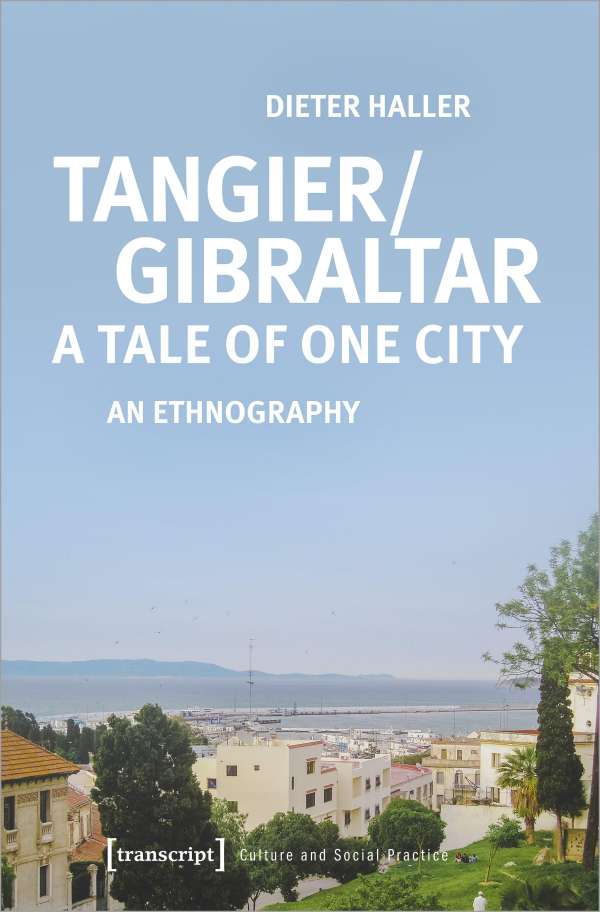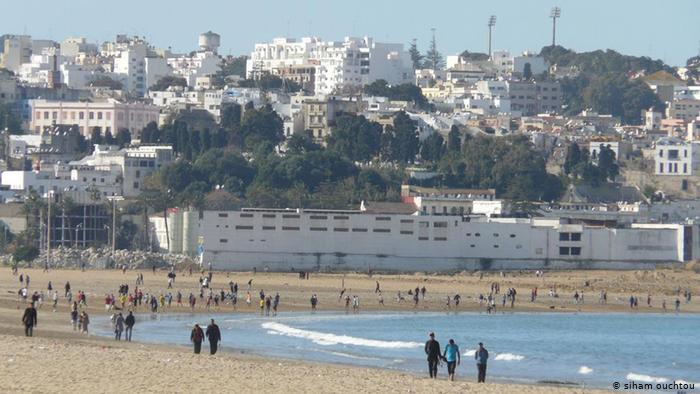Tangier/Gibraltar: a tale of one city

Is "TanGib" a fantasy or a reality? And if it is not a political reality, could it perhaps be a cultural reality?
Dieter Haller: Administratively, it has never been a reality, even though British diplomats and the British military were present in both cities. Think about Caid Henry McLean, who served in Gibraltar and later organised the sultan's military.
As an anthropologist, I focus more on informal than on formal relationships. That is why I speak of a single city. In some periods of history, the two locations were so closely interconnected in terms of demography, formal and informal commerce, family relationships, property, etc. that I dare to call them "TanGib". So it was a reality in some periods. In others, these interconnections were considerably looser. Next to the British, Sephardic Jews were crucial to these bonds, but they were not alone: think of families such as the Petris, the Saccones, the Katzaros, the Ferraris, all of whom were based in both places.
Could it represent a cultural reality? It already (or still) does: people perceive the same winds, waves, temperature, noises and dirt. Think about the ever-present seagulls! Think about Gibraltarian Moroccans who – in addition to Darija – prefer to speak the Gibraltarian language, Yanito, rather than English or Spanish.
Could it represent an even more influential cultural reality in the future? Yes, definitely. But that, of course, depends on further geopolitical developments, such as common British–Moroccan interests.

You have conducted research about Seville, Gibraltar and Tangiers. What unifies these regions is their Andalusian past. Could this shared past play an important role in unifying the two shores of the Mediterranean, or will the Eurocentric vision continue to dominate this North–South relationship?
Haller: Anthropology is not a prognostic discipline, so my expertise is on "what people do" rather on "what they will do in the future". We do have, of course, a thorough basis of knowledge, networks and long-time experience in our research areas. That allows me to develop some ideas about the future. Morocco has its interests and projects with the other side; the UK and Spain have their own. Naturally, Europe interprets the situation from a Eurocentric perspective. This perspective could be successfully challenged if Morocco understands how to brand itself to Europeans as a gateway not only to the South, but also to its sub-Saharan partners, as a gateway to the North, or – given the new port – to the world. Morocco is by far the most successful country in the North/Northwest of Africa. It should not just react to European thinking, but create its own role as a regional power.
In some aspects, Morocco's new role has already changed thinking – and behaviour. Think about the Campo de Gibraltar. La Línea, for example, is one of the poorest places in Spain. Poverty in other places in the region has increased as a result of the financial crisis. Unemployment is high. I have met younger Spanish couples who have crossed the Straits in search of economic opportunities. We will see, Inshallah.
In your book, you discuss Brexit. What role can Gibraltar play in the relationship between Britain, Morocco and Africa in general?
Haller: A crucial one. Like Tangier, it can control the Boughaz. If we are to believe British Prime Minister Boris Johnson, a tunnel from Khanfouch to Gibraltar is being planned. This is the first of many failed projects that sought to connect Africa and Europe. Given the tectonic conditions in the Boughaz, I am not sure if this project is realisable.
And here is another point: given that HM Mohammed VI and the Alaoui dynasty has always – at least since the 20th century – protected the Sephardic communities, Gibraltar is the only one left in the area (putting aside those in Ceuta and Melilla – that is a different problem). Even though there are no more than about 1,000 Jews in Gibraltar, they are closely connected through family and commercial ties to those Jews and their descendents from Tangier, Tétuoan, Asilah etc., who now live abroad, especially in Canada, Latin America and Israel. So from a functional point of view (which is not mine), one could say that this is a very good "resource" for common politics between Morocco and the UK.

Please explain the concept of the "culture circle", especially in the context of "TanGib"?
Haller: The concept of the "cultural circle" is usually taken to mean a closed region, internally quite homogenous and very different to other circles. This misappropriation of the circle by dumb scientists and public discourse does not reflect its original meaning, which was developed by Frobenius and Graebner in the early twentieth century. What they had in mind was to find a concept for cultures that are more closely connected to each other than to other regions. In their sense, cultural circles of course have links to the outside, and are not homogenous at all. If a community, an ethnic group etc. has more in common with another entity on many levels, one can call them "cultural circle" – even though, admittedly, the term "circle" is maybe not the cleverest one because it carries the notion of closure.
That said, the Boughaz for me is a "cultural circle", because for centuries, people, language, food, a way of living etc. have been so closely connected with each other – much closer than let's say Gibraltarians with the region of Málaga or Tangier with Marrakech. To sum up: close connections in many different areas for a longer time or period – that's what I would call a cultural circle.
And it could offer a way out of identitarianism which has poisoned so much of contemporary thinking, be it ethnicity, culture, gender or whatever, but a way out based on scientific empirical fieldwork which is genuine to my discipline. Much of the current reasoning is based on identity as confession: "I am this, I am that." We try to value that as well, but it is not what people say, but what they do that is more important. That is why we do not like interviews: what people say, what they say they do and what they do are not the same.
You have not devoted much space in the book to the issue of migration, even though it is one of the main issues dominating relations between the two shores of the Mediterranean. Doesn't the migration tragedy confirm the difficulty of talking about something like "TanGib"?
Haller: No, it doesn't. Most colleagues who work in the area only focus on issues relating to migration: the desire to migrate, the disaster of migration, the energy that people invest in it. Everything is tragic and has been documented many, many times. We don't need another anthropologist doing the same thing. I prefer to look at the life paths of the 80–90 per cent who do not migrate, who have a local life.
Besides, my focus is on Tangier and Gibraltar. I do look historically at the migration between the two places: Spanish Liberals in the nineteenth century who left Spain via Gibraltar, Jewish Refugees who left for Gibraltar via Tangier in the Berber Wars in 1886, gay British refugees (often denigrated as mere eccentrics) who went to Tangiers in the 1940s and 50s, Jews that left Morocco after Independence, Moroccan workers who have migrated to Gibraltar since 1965.

What about the presence of Moroccans in Gibraltar? Does their marginal presence not confirm the Western culturalist vision of the other?
Haller: Yes and no. Gibraltar brands itself as cosmopolitan; a place where Protestants, Catholics, Muslims, Jews and Hindus live together in harmony. After 30 years in the area, I can say that yes, this image is not wrong. That is why it is a place that I cherish and hold in high esteem.
However, until recently, the groups in Gibraltar were hierarchised, it saw itself as mainly British and Jewish. But one should not simply brand Gibraltarians as mere representatives of the West. It was a colonial population that had to find its own identity beyond being either Spanish or British. That depended on outer conditions: they wanted to prove that they have nothing in common with Andalusians, because Spain tended to regard them just as "strange Spaniards", but they stressed their Britishness, which was the result of education policy: Gibraltarians sent their children to British universities. Most came back to the Rock, with the experience of being accepted not as "British like the British", but as "Colonial Brits".
In the 1990s, the national movement proclaimed a Mediterranean Britishness, due to their roots in Malta, Catalonia, Genoa and Portugal. These were the years when I carried out my first fieldwork in Gibraltar. Alas, Jews, Muslims and Hindus were excluded from the national narrative. This changed in the 2000s and changed even more in the 2010s. A Hindu became president of the parliament, a Jewess became leader of the opposition, a Muslim Girl was elected Miss Gibraltar and in 2015, Chief Minister Fabian Picardo publicly honoured the third generation of Muslims as being part and parcel of the Gibraltarian identity. One may call that western culturalist, but I wouldn't, because on a community level – remember I am more interested in what people do than in what they say – people from all groups intermarry, go to school together, play football or drink and eat with each other. In my view, things changed. And for the better, Hamdullah.
Islam doesn't feature strongly in this book, despite the great symbolism of Gibraltar in the minds of Muslims. Is this due to a suppression of Islamic culture and history in Gibraltar and Andalusia?
Haller: The timeframe I was dealing with covers the years between the British Conquest of the Rock in 1713 until 2021. And it definitely focuses on historical sources from both sides that deal in some way or the other with "those on the other side". I have to admit that Islamic sources are sparse, maybe I overlooked some perspectives here. I do deal with the early 1990s when the Saudis financed and built the magnificent mosque at the southern tip of the peninsula on an symbolic site. However, for a long time it was not open to Gibraltarian Muslims, at least for the majority, the Moroccan workers. The Saudis explicitly did not want that. Moroccan Gibraltarians benefitted least from the mosque as a spiritual site.
One also has to recognise that Moroccan workers and their children and grandchildren were not appreciated as "fellow Gibraltarians". This, however, happened also to the Sindhi Hindus, who were present in the Boughaz for several generations. Because Gibraltarians feared that they could claim the legal status to become Gibraltarian, most of their spouses had to live outside Gibraltar, e.g. in the Campo or in Tangier. To recognise Hindus and Muslims as Gibraltarians and to celebrate them as "fellows" is a relatively new development since 2005.
© Qantara.de 2021
Interview conducted by Fouzia Hayouh
"Tangier/Gibraltar- A Tale of one city: An Ethnography" (2021, 278 pages), by Dieter Haller, is published by transcipt
